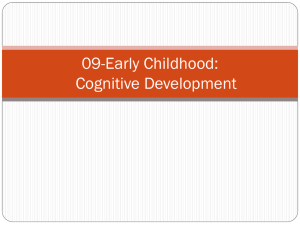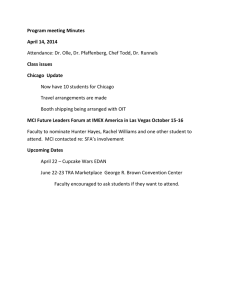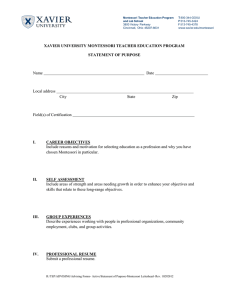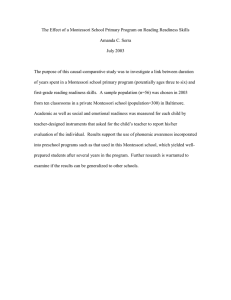ASSIGNMENT QUESTIONS GUIDELINES FOR ASSIGNMENTS
advertisement
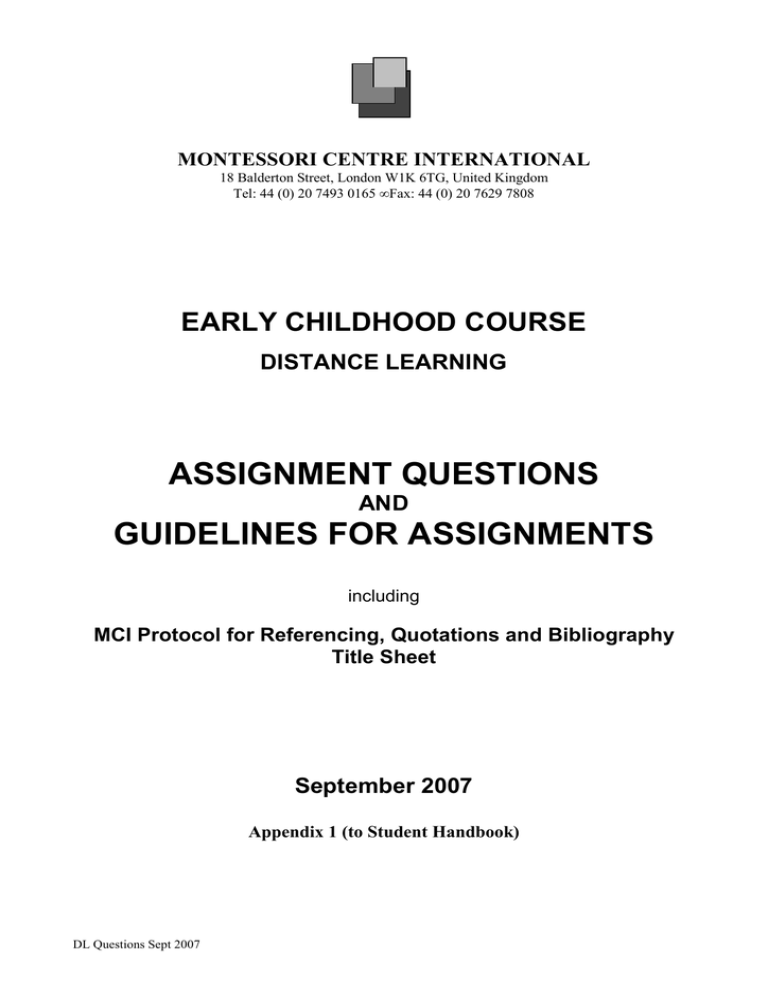
MONTESSORI CENTRE INTERNATIONAL 18 Balderton Street, London W1K 6TG, United Kingdom Tel: 44 (0) 20 7493 0165 • Fax: 44 (0) 20 7629 7808 EARLY CHILDHOOD COURSE DISTANCE LEARNING ASSIGNMENT QUESTIONS AND GUIDELINES FOR ASSIGNMENTS including MCI Protocol for Referencing, Quotations and Bibliography Title Sheet September 2007 Appendix 1 (to Student Handbook) DL Questions Sept 2007 MCI Early Childhood Distance Learning Assignment Questions Sept 07 EARLY CHILDHOOD COURSE GUIDELINES FOR ASSIGNMENTS Please submit ONE answer to each assignment. Essays should be approximately 1750 words (with a 10% allowance either way before marks will be deducted), whereas practical based assignments and Observations (assignment 8) have no word length criteria. Assignments can be typed or hand-written. Please remember to put your name and student number on each page and number the pages. GENERAL REMINDERS • Plan all your answers carefully. • Make sure you introduce and conclude your work. • Try to show evidence of your reading in your work, through the inclusion of quotations. • Cross-reference all quotations. • Ensure quotations are used in an illustrative capacity, and not to make statements. • Include a bibliography for each assignment that you answer. • Assignments with incorrect bibliography, referencing and/or quotations will be marked down. • Start preparing for your observations (assignment 8) as early as possible. It is strongly recommended that you send the first two observations fully evaluated to your tutor for initial comments. This will ensure that you will be given appropriate guidance before you submit the whole assignment (i.e. five individually evaluated observations together with the final evaluation). • When selecting essay topics it is strongly recommended that those students who are in teaching practice, have access to the prepared environment or to children between the ages of two to six, select questions B relating to assignments 9 - 14. • Please note that with these practical assignments you will not be able to send the actual materials you have made for marking. It is recommended to take photographs of the materials and of the children working with them, to illustrate your assignment. Students are reminded to consult their Study Skills Handbook and the attached MCI Protocol for Referencing, Quotations and Bibliography . GLOSSARY OF TERMS DESCRIBE: Requires a report of the major features of an issue. DISCUSS: Present and examine clearly several sides of an issue. The discussion may require consideration of a number of views or theories. EVALUATE / ASSESS: Requires the examination of the strengths and weaknesses of a particular approach. A brief description may be necessary, though the descriptive element should occupy a minor part of your essay. 2 MCI Early Childhood Distance Learning Assignment Questions Sept 07 EARLY CHILDHOOD DISTANCE LEARNING ASSIGNMENT QUESTIONS PHILOSOPHY (Module 1) Assignment 1 Define the term sensitive periods, and explain how the teacher’s knowledge and understanding of these periods determines his/her preparation and custodianship of the prepared environment. • Define the term sensitive periods and give full details of the six main periods, together with examples to show your understanding. • Explain why it is important to support and facilitate these periods during the child’s first stage of development. • Outline any adverse consequences of not recognising and supporting the child’s sensitivities. • Give details of how the teacher ensures that each individual period is supported through the prepared environment, so that the child can reach his/her optimum development. Suggested reading: The Absorbent Mind - Chapters 3,7 and 23. The Secret of Childhood - Chapters 7, 8 and 26 Assignment 2 Explain how the role of the teacher changes in the process of the child’s growing normalisation (socialisation). • Define the term normalisation, linking it with the concept of deviations. • Outline the environmental aspects that support normalisation. Explain the maturational nature of normalisation linked to the child’s growing social development. • Describe the teacher’s initial approach with new children. • Explain the change in the teacher’s role as each child begins to concentrate and focus on activities, and the impact this has on the child’s growing normalisation. • Show an understanding of why the child might regress. Suggested reading : The Absorbent Mind: Chapters 19, 22, 23 and 26 The Secret of Childhood: Chapters 15 (the beginning) and 23 3 MCI Early Childhood Distance Learning Assignment Questions Sept 07 Assignment 3 Montessori saw movement as a harmonising factor in the child’s development. Explain how the underpinning ethos of the prepared environment facilitates a balance between the mental and physical energies of the child. • Give a detailed explanation of Montessori’s concept of movement, and relate this to the child’s sensitive period for movement. • Explain what state will result if the child’s psychic (mental) and physical energies do not develop in harmony. • The ethos of freedom in respect of choice, repetition and movement itself, needs to be considered. • Links between movement and the development of the intellect – aspects such as control, coordination, manipulation, exploration and a growing ability to concentrate - need to be considered, together with explanations and examples. Suggested reading : The Absorbent Mind: Chapters 13 and 14 The Discovery of the Child: Chapter 5 The Secret of Childhood: Chapters 15. Assignment 4 Explain the relationship between discipline and obedience from the Montessori perspective. Explain how discipline and obedience are linked to the development of the will. • Define the terms discipline and obedience from a Montessorian perspective. • Explain how discipline is fostered through the favourable environment. • In explaining the maturational development of discipline show how it is linked to the development of the will. Consider how these interlinked aspects of development are the foundation of the development of obedience. • Describe the three levels of obedience using examples to show your understanding. • Explain why discipline, the will and obedience are characteristics of the social embryonic stage of the Absorbent Mind (3-6 years). Suggested reading : The Absorbent Mind: Chapters 23, 25 and 26 The Discovery of the Child: Chapters 3 and 23 The Secret of Childhood: Chapter 19 – ‘Discipline’ 4 MCI Early Childhood Distance Learning Assignment Questions Sept 07 CHILD DEVELOPMENT (Module 2) Assignment 5 Explain how and why children’s play changes over the first six years of life. Include examples to support your explanation. • Give a definition of play. • Consider the features and functions of play. • Explain how children’s play is dependent upon their developing physical, intellectual, linguistic, emotional, and social maturity during the first six years of life. • Briefly demonstrate how all areas of development are inter-related through play experiences. • Link this maturational development to the child’s ability to engage in more complex, and more social play. • Use theoretical studies and give examples from nursery and/or your own children to support your argument. Suggested reading: MCI Module 2, Chapter 5 MacLeod-Brudenell (ed), Advanced Early Years Care and Education, Chapter 7 and part of Chapter 5. www.waldorflibrary.org/Journal_Articles/GW5002.pdf www.gymboreeplayuk.com/franciswardle.html - Handout 1 - See Reading Handout Appendix to Assignment Questions 5 MCI Early Childhood Distance Learning Assignment Questions Sept 07 CONTEMPORARY ISSUES (Module 4) Assignment 6 Explain the term equal opportunities in relation to early years (pre-compulsory school age) practice. Explore your country’s commitment to the UN Convention on the Rights of the Child and explain the impact of the Convention (if any) on your country’s legislation. Consider what steps you would take in implementing equality of opportunity for children in an early years setting in your country. • Define the term equal opportunities generally and specifically in respect of both children and staff in an early years setting. • Using the handout provided, research your own country’s position regarding the Convention, and determine whether or not their commitment has been enshrined in best practice or attitude. • With regard to the implementation of equal opportunities in the early years setting in your country, consider how such implementation can ideally be met. Include such aspects as writing a policy, training, monitoring and provisions. Suggested reading: MCI Module 4 – Contemporary Issues. MacLeod-Brudenell (ed) Advanced Early Years Care and Education, Chapter 11 Handout 2 - See Reading Handout Appendix to Assignment Questions CHILD CARE AND HEALTH (Module 5) Assignment 7 Explain what constitutes the physical and psychological needs of a three year old child. Discuss how these needs can ideally be met in a day care setting (8.00am-6.00pm : 5 days per week) in your own country. • Define physical needs – exercise, diet, health and safety - and give a full explanation of the steps carers should ideally take to fulfil these various needs. • Define psychological needs – focus on emotional and social needs – and give a full explanation of the steps carers should ideally take to ensure the child’s social and emotional well-being. • Remember to consider the child-care and health issues that need to be met by the nursery. Suggested Reading: MCI Module 2- Child Development Ch 3 MCI Module 4- Contemporary Issues Ch 3 MCI Module 5- Child Care and Health MacLeod-Brudenell (ed) Advanced Early Years Care and Education, Chapters 4, 3 and 14 6 MCI Early Childhood Distance Learning Assignment Questions Sept 07 OBSERVATIONS (Module 3) Assignment 8 Undertake to write a Child Profile by carrying out 5 observations of the same child aged between 2½ and 6 years of age. Each observation must cover one of the areas of development (physical, intellectual, linguistic, social, and emotional). The Child Profile is then a summary of the child’s overall development. You must use at least three different observational techniques, and it is recommended that these are – check list, narrative and event or time sampling. 1) 2) 3) 4) 5) 6) 7) Complete observation cover sheet: • Complete all the relevant data required prior to undertaking the observation, such as background details of the child (for confidentiality use first name only), age in years and months, gender, position in family and any other relevant information such as does the child go to a playgroup/nursery, any allergies or special needs etc. You need to include the context in which you observed the child’s behaviour, activity or interaction. Each observation should be carried out on a different occasion, preferably in a different setting. • You must include the written permission from the family to observe the child and use photographs in your profile (if you choose to include them). • Include the method of recording the observation, read the module carefully to ensure that you have chosen the most appropriate method for the aim of your observation. • Set a considered aim. Your aim must be relevant to the observation and focussed. Record the Observation • This needs to be written objectively. Evaluation • Evaluate against the set aim using only the information cited in the observation. You must not include any prior knowledge of the child in the evaluation (unless this is detailed on your front information sheet) and only evaluate what you have recorded in the observation. Each evaluation must show evidence of your ability to relate the information gained against your knowledge of child developmental theory, using quotations and references to support your conclusions. Personal Learning • This section relates to your own learning only. For example, about the method, or your own ongoing professional development. • Do not include evaluations on the child here. Child Profile • Once you have completed and evaluated all 5 observations, summarise these observations by writing a detailed evaluation of the child’s overall development. (The totality of this work will comprise your child profile.) Again, you must show an ability to support your findings with knowledge of child developmental theory, and cross reference your findings to your observations. Bibliography • A correct and relevant bibliography. Any photographs or samples of work included must be dated, explained and referenced to the relevant observation. Submission • Step one - Submit one checklist and one narrative observation to your tutor. These will be marked (but not graded) by your tutor and treated as trial observations. This will enable your tutor to give you valuable feedback, which you should consider when completing the remaining observations. These will subsequently form part of your Child Profile. • Step two – Submit your Child Profile, which comprises all 5 observations and the overall evaluation, (make sure you have used all three observational techniques recommended). The three final observations and the overall evaluation will be marked individually and your final grade will be the average of all four pieces of work. Suggested reading: MacLeod-Brudenell (ed), Advanced Early Years Care and Education, Chapter 9 7 MCI Early Childhood Distance Learning Assignment Questions Sept 07 MCI OBSERVATION ASSESSMENT SHEET English as a second Language □ Name St.Number_______________________ Date of Observation Observation Number_______________ Tutor’s signature Date Grade__________________________ Moderator’s signature Date Grade__________________________ Resubmission Date Cover sheet Structure of observation Resubmission Grade___________________ Enclosed and fully completed All headings included Knowledge and understanding Demonstrated where appropriate of equality of opportunity Quotations □ Correct □ Incorrect Referencing □ Correct □ Incorrect Bibliography □ Correct □ Incorrect Not enclosed or partly completed Not all headings included Not demonstrated □ Not included □ Not included □ Not included Criteria Distinction 100% – 80% Merit 79% - 65% Pass 64% – 50% Reference 49% and below Aim and rationale Aim and rationale detailed, well defined and linked to observation Detailed, objective and clear records of what was observed In depth knowledge of Child development, showing clear understanding of the relationship between observation and theory Aim is detailed, well defined and linked to observation Aim is related to observation Not included or not related to observation Detailed and objective record of what was observed Thorough knowledge and understanding of child development, and confident grasp of the relationship between theory and practice shown An ability to evaluate and analyse the observation shown. Objective record of what was observed Subjective record of what was observed Knowledge and understanding of child development shown, and an ability to link theory to practice demonstrated An ability to draw appropriate conclusions from the observation shown Some relevant learning evidenced Limited knowledge and understanding of child development. An ability to link theory to practice not demonstrated Recording of Observation Evaluation Understanding of the relationship between theory and practice Evaluation – Critical analysis Personal Learning An ability to evaluate and analyse the observation critically demonstrated Well considered and detailed An ability to learn from the observation demonstrated. No ability to draw conclusions from the observation demonstrated Not included or not relevant to own learning Comments: 8 MCI Early Childhood Distance Learning Assignment Questions Sept 07 Montessori Centre International Observations – Cover Sheet Name: Student number: Date of Observation: Observation No: Observation Technique: Starting Time: Finishing Time: No: of Children: No: and rôle of Adults: Permission Sought From: Signature: Description of Setting: Immediate Context (Playground, Art Corner etc.): First Names of Child(ren) Observed: Brief Description of Child(ren) – ie gender/age/position in family/first language (if relevant): Rationale for Observation (if appropriate): Aim of Observation: 9 MCI Early Childhood Distance Learning Assignment Questions Sept 07 10 MCI Early Childhood Distance Learning Assignment Questions Sept 07 PRACTICAL LIFE (Module 6) Assignment 9a Explain how the principles of Montessori philosophy underpin the Practical Life activities. • Explain why we have practical life activities in the Montessori nursery, focussing on the importance of the indirect objectives, and linking these to philosophical aspects such as sensitive periods, the horme, independence, freedom and self discipline. • Support your discussion with appropriate examples of activities from the 3 areas of Practical Life. Suggested reading: MCI Module 6 – Practical Life The Discovery of the Child: Chapter 3 from section ‘The Environment’ to end, Chapter 4 from section ‘The Place of Nature in Education’ to end. Chapter 5, Chapter 23 p. 203-307 The Secret of Childhood: Chapter 18 sections: ‘Silence’ and ‘Dignity’, Chapter 12 Revisit sensitive periods from Assignment 1. OR Assignment 9b Design a Practical Life activity suitable for a child between 2.5 and 6 years of age. Write it up as a full lesson plan following the attached model. Present the lesson to a child, write up the implementation, evaluate the lesson and reflect upon its effectiveness. (no word length criterion) • Consider the principles of Montessori philosophy when designing your Practical Life lesson plan. • Consider where your activity would fit as part of the sequence of materials. • Do not send the activity with your assignment, but include diagrams or photographs of the lesson with your notes. • It is hoped that you will use the activity when undertaking teaching practice in the future. Suggested Reading: MCI Module 6 – Practical Life 11 MCI Early Childhood Distance Learning Assignment Questions Sept 07 LESSON PLAN Subject / Title Materials - list all required materials Objectives/ Learning Goals - identify all objectives, both direct and indirect Control of error (but only if obviously appropriate) Age range: Date of Lesson: Anticipated duration: Adult/child ratio: Time of Lesson: Setting: Pre-requisites: - identify the child(ren)’s previous knowledge/skills necessary to undertake this lesson. Advance preparation for the lesson: what the teacher needs to get ready for the lesson. Step by step guidelines: Write a plan for the lesson. Remember that anyone should be able to use this plan to present the lesson, so it is essential that the information is clear and detailed. Differentiation: Consider the needs of different children, different ages, special needs or where English is not the mother tongue. Indicate any possible changes to the lesson plan. Implementation of the lesson Write a detailed implementation - everything that happened during the lesson – as soon as possible after the lesson. Following implementation of the lesson, please ask the person who permitted this lesson to sign and date the lesson plan. Evaluation of the implementation Complete as soon as possible after the lesson was carried out with the child(ren), relating back to the objectives/learning goals and the implementation to determine the effectiveness of the lesson. Personal Learning Reflect on how the lesson went. Consider your own learning about the lesson and its implementation and note any possible future modification - improvement, refinements or extensions to the materials and/or the presentations. Bibliography This is to include any books used in the preparation and delivery of the lesson, as well as for the evaluation. Suggested reading: MacLeod-Brudenell (ed) Advanced Early Years Care and Education, Chapter 8, Appendix 1(pages 268 – 9). Chapter 2 on reflective practice. 12 MCI Early Childhood Distance Learning Assignment Questions Sept 07 EDUCATION OF THE SENSES (Module 7) Assignment 10a Explain how the principles of Montessori philosophy underpin the Sensorial activities. • Explain why we have sensory activities in the Montessori nursery, focussing on the importance of the objectives, and linking these to philosophical aspects such as sensitive periods, repetition, the ability to control the error, the mathematical mind and indirect preparation for other areas of the curriculum. • Support your discussion with appropriate examples of Sensorial activities. Suggested reading: The Absorbent Mind: Chapters 14, 16 (especially p.166-170) The Discovery of the Child: Chapters 6 ,7 ,8, 9, 11, Chapter 12 section “Mental Order”, Chapter 13 sections “Silence-Materialised Abstractions” The Secret of Childhood: Chapter 12, first section p.80-83. MCI Module 7- Sensorial – consider also Maths, Literacy and Cultural Modules Revisit sensitive periods from Assignment 1. OR Assignment 10b Design a Sensorial activity suitable for a child between 2.5 and 6 years of age. Write it up as a full lesson plan following the model to Question 9b. Present the lesson to a child, write up the implementation, evaluate the lesson and reflect upon its effectiveness. (no word length criterion) • Consider the principles of Montessori philosophy when designing your Sensorial lesson plan. • Consider where your activity would fit as part of the sequence of materials. • Do not send the activity with your assignment, but include diagrams or photographs of the lesson with your notes. • It is hoped that you will use the activity when undertaking teaching practice in the future. 13 MCI Early Childhood Distance Learning Assignment Questions Sept 07 MATHEMATICS (Module 8) Assignment 11a Discuss how the Montessori mathematics materials can be seen as an essential support for Piaget’s theory of the development of logico-mathematical thought. • Explain what you understand by the development of logico-mathematical thought and link this to Montessori’s concept of the mathematical mind. • Piaget’s theory of cognitive development needs to be addressed, paying particular attention to the process of abstraction through adaptation and organisation of concepts and information. • Give examples of relevant Montessori mathematics materials and discuss how they enable the child to begin to understand mathematical concepts and operations through concrete manipulation. Suggested reading: The Absorbent Mind Chapters 17, 18, and 19 MCI Module 2 Child Development MCI Module 8 - Mathematics MacLeod-Brudenell (ed), Advanced Early Years Care and Education, chapter 5. OR Assignment 11b Design a Mathematics activity suitable for a child between 2.5 and 6 years of age. Write it up as a full lesson plan following the model to Question 9b. Present the lesson to a child, write up the implementation, evaluate the lesson and reflect upon its effectiveness. (no word length criterion) • Consider the principles of Montessori philosophy when designing your lesson plan. • Consider where your activity would fit as part of the sequence of materials. • Do not send the activity with your assignment, but include diagrams or photographs of the lesson with your notes. • It is hoped that you will use the activity when undertaking teaching practice in the future. Suggested reading: MCI Module 8 – Mathematics Also modules 6, 7, 10 14 MCI Early Childhood Distance Learning Assignment Questions Sept 07 LITERACY (Module 9) Assignment 12a Explain how we indirectly prepare children for the Montessori literacy curriculum. Illustrate your answer with appropriate examples. • Define what is meant by literacy. • Determine the underpinning skills/abilities needed to scaffold the child’s entry into literacy. • Consider how the Practical Life, Sensorial, Cultural and Creative curriculum areas, as well as the introductory activities in Literacy, support these skills/abilities. • Explain the importance of books, story telling, and language games support the child’s joy in, and of, literacy. Suggested Reading: The Discovery of the Child: Chapters 15 and 20 MCI Modules 6, 7, 9 and 10 OR Assignment 12b Design a pre-reading/early literacy activity suitable for a child between 2.5 and 6 years of age. Write it up as a full lesson plan following the model to Question 9b. Present the lesson to a child, write up the implementation, evaluate the lesson and reflect upon its effectiveness. (no word length criterion) • Consider the principles of Montessori philosophy when designing your literacy activity. (Early literacy would include knowledge and skills up to and including Pink Box 3). • Consider where your activity would fit as part of the sequence of materials. • Do not send the activity with your assignment, but include diagrams or photographs of the lesson with your notes. • It is hoped that you will use the activity when undertaking teaching practice in the future. Suggested Reading: The Discovery of the Child: Chapters 15 and 20 MCI Modules 6, 7, 9 and 10 15 MCI Early Childhood Distance Learning Assignment Questions Sept 07 CULTURAL STUDIES (Module 10) Assignment 13a Explain how Montessori’s theory of Cosmic Education underpins the child’s knowledge and understanding of their environment and the World. • Define what is meant by Cosmic Education. • Make links to all areas of the Cultural curriculum, giving examples of specific activities/materials to support your argument. • Explain how the cultural activities encourage observation, exploration and investigation, which will lead to later hypothetical thinking. Suggested reading: The Absorbent Mind: Chapter 6, and Ch 17 (parts). MCI Module 10 – Cultural Handout 3 - See Reading Handout Appendix to Assignment Questions OR Assignment 13b Plan a detailed project theme using either the curriculum wheel or spider chart (see Appendices 2 and 3 in the Cultural Module). From this wheel/chart, select one cultural activity and write up a lesson plan following the model attached to question 9b. Present the lesson to a child, write up the implementation, evaluate the lesson and reflect upon its effectiveness. (no word length criterion) • Explain why you have chosen the topic for the project. • Consider where your activity would fit as part of the sequence of materials. • Do not send the activity with your assignment, but include diagrams or photographs of the lesson with your notes. • It is hoped that you will use the activity when undertaking teaching practice in the future. Suggested reading: MCI Modules 6-11 16 MCI Early Childhood Distance Learning Assignment Questions Sept 07 CREATIVE SUBJECTS (Module 11) Assignment 14a Explain how the Montessori environment facilitates the child’s creativity. • Explain what is meant by creativity. Link creativity to the child’s imagination. • Link creativity generally to Practical Life, Sensorial, Literacy and Cultural activities. • Outline the creative areas of the classroom. • Explain how the freedom and philosophy of the Montessori environment support the process of creativity. • Illustrate your discussion with relevant examples of activities from each creative area (music, movement, art, crafts, literature and drama). Suggested Reading: The Discovery of the Child: Chapters 20 and 21 MCI Module 11 - Creativity OR Assignment 14b Design a Creative activity suitable for a child between 2.5 and 6 years of age. Write it up as a full lesson plan following the model to Question 9. Present the lesson to a child, write up the implementation, evaluate the lesson and reflect upon its effectiveness. (no word length criterion) • Consider the principles of Montessori philosophy when designing your Creative lesson plan. • Do not send the activity with your assignment, but include diagrams or photographs of the lesson with your notes. • It is hoped that you will use the activity when undertaking teaching practice in the future. Suggested Reading: MCI Module 11 – Creativity Also other modules 17 MCI Early Childhood Distance Learning Assignment Questions Sept 07 18 MCI Early Childhood Distance Learning Assignment Questions Sept 07 Summary of MCI protocol for referencing, quotations and bibliographies (replacing pages 33-34, 36-38 in Study Skills) Referencing of terminology always cross reference terms (such as horme, spiritual embryo etc) when first mentioned in an essay and when definitions are given example: The child’s sensitive periods first manifest themselves during the stage of the spiritual embryo (Montessori, 1988a). Referencing to text when paraphrasing text or relating to text read, acknowledge the source example using a book: Montessori (1988a) believed that all children undergo several embryonic stages; she talks about the physical, spiritual and social embryo. example using a book with secondary sources: The child builds his/her knowledge of the world through the twin processes of assimilation and accommodation (Piaget in Bruce & Meggitt 2002). Quotations when quoting directly from text, use quotation marks and give full reference of the author, year of publication of the book and a page on which the quotation appears example of a quotation from a book with one author: When describing the first stage of the child’s development Montessori explains that “The developing child not only acquires the faculties of man; ….. but, at the same time, he adapts the being he is constructing to the conditions of the world around him.” (Montessori, 1988a, p. 56) example of a quotation from a book with several authors “Conservation refers to a person’s understanding that superficial changes in the appearance of a quantity do not mean that there has been any fundamental change in that quantity.” (Smith et al. 2003, p. 402) example of a quotation from an edited book with several contributors “Very young children should always be encouraged to write freely about anything that interests them.” (Lane, in Fontana, 1993, p. 202) example of a quotation from a magazine article “A wide range of tools can be used to enhance the music …. . These props bring the...songs to life.” (Newcome & Ross-Masson, May 2004, p. 11) example of a quotation from a website “By freedom, however, Montessori did not suggest that the child should be free to do whatever he chooses.” (http://www.montessori.uk.com/Students/library3a,7.html) No other references are required; do not use footnotes, or list references at the end of the essay 19 MCI Early Childhood Distance Learning Assignment Questions Sept 07 Bibliography Summary of all text consulted in preparation of the essay, some of which may have not been used in quotations or referenced: Example of a bibliography which uses books, articles and website sources Bruce, T. & Meggitt, C. (2002, Third Edition). Childcare and Education, Hodder & Staughton, London Epstein, P. (undated). Goldilocks and the Sensitive Periods of Maria Montessori http://www.montessori.org/resources/library/Educational/sensitiveperiod.html Feldman, R. (1996). Understanding Psychology, McGraw-Hill Inc, New York Lane, S. “Learning & Teaching Writing Skills” in Fontana, D. (1993, Second Edition). The Education of the Young Child, Blackwell, Oxford Little Oxford Dictionary, The (1984). Oxford and Clarendon Press, Oxford Montessori Centre International (undated). Mathematics, Module 8, MCI, London Montessori, M. (1972). The Secret of Childhood, Ballantine, New York Montessori, M. (1988a). The Absorbent Mind, ABC Clio, Oxford Montessori, M. (1988b). The Discovery of the Child, ABC Clio, Oxford Newcome, Z. & Ross-Masson, C. (May 2004). Tunes to Tempt Toddler in Under Fives Magazine, Preschool Learning Alliance, London Pound, L. (2003). Supporting Mathematical Development in the Early Years, Open University Press, Buckingham Smith, P.K. Cowie, H. Blades, M. (2003, Fourth Edition). Understanding Children’s Development, Blackwell Publishing Ltd , Oxford www.montessori.uk.com Montessori Resource Library, (undated). Freedom, http://www.montessori.uk.com/Students/library/3a,7.html 20 MCI Early Childhood Distance Learning Assignment Questions Sept 07 MONTESSORI CENTRE INTERNATIONAL 18 Balderton Street, London W1K 6TG, United Kingdom Tel 00 44(0) 20 7493 0165 • Fax 00 44 (0) 20 7629 7808 E-mail: mci@montessori.uk.com TITLE SHEET Please tick if English is not Please tick one: your first language Part-time Centre Distance Learning Student London College Student Part-time Full-time STUDENT NAME: _______________________________________________________________ STUDENT NO:__________________________________________________________________ NAME OF TUTOR:______________________________ GROUP:________________________ COURSE:_______________________________________DATE: _________________________ ASSIGNMENT NO:______________________________NO. OF WORDS:________________ BIBLIOGRAPHY ENCLOSED Please write the essay title in FULL below: ____________________________________________________________ ________________________________________________________________________________ ________________________________________________________________________________ ________________________________________________________________________________ ________________________________________________________________________________ ________________________________________________________________________________ Other relevant information (change of address or other information affecting the return of this essay) ________________________________________________________________________________ ________________________________________________________________________________ ________________________________________________________________________________ Date of change of address if applicable ______________________________________________________________ 21
